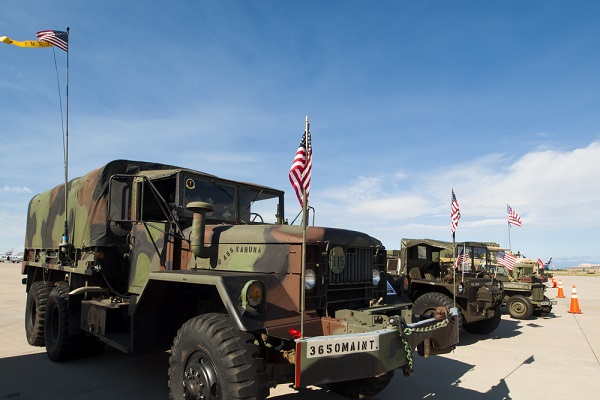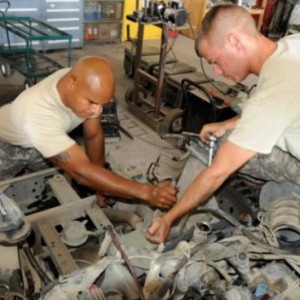
By Jane Langland, Communications Manager, Cox Automotive
November 8, 2023
 In honor of Veterans Day 2023, we’re spotlighting Alante Rhoden, a dedicated Cox Automotive Mobility’s Fleet Services member who has transitioned his military skills into the civilian sector. Alante has been a passionate leader at Cox Automotive Mobility’s Fleet Services for five years, where he has spent his time as a hands-on mechanic at his Orlando, Florida-based shop. However, before he dedicated his impressive skills to Fleet Services, Alante spent eight years as a 91 Bravo in the Army, where he was responsible for repairing all wheeled vehicles regardless of size. Fleet Services takes great pride in their veteran employees and is honored to highlight someone whose determination pushes them toward a brighter future.
In honor of Veterans Day 2023, we’re spotlighting Alante Rhoden, a dedicated Cox Automotive Mobility’s Fleet Services member who has transitioned his military skills into the civilian sector. Alante has been a passionate leader at Cox Automotive Mobility’s Fleet Services for five years, where he has spent his time as a hands-on mechanic at his Orlando, Florida-based shop. However, before he dedicated his impressive skills to Fleet Services, Alante spent eight years as a 91 Bravo in the Army, where he was responsible for repairing all wheeled vehicles regardless of size. Fleet Services takes great pride in their veteran employees and is honored to highlight someone whose determination pushes them toward a brighter future.
Can you describe your time in the military? What was your role and experience?
I tell people all the time that I thank the army a lot. Coming out of high school, everybody wanted to play football, but I didn’t know what I wanted to do. I decided to join the Army. That’s what shaped me into the man I am today. It taught me to be more responsible, collaborate, and be on a team to complete tasks. It showed me how one person can’t do everything. We need a team to come together to solve one problem or complete one task. I think that’s one of the biggest lessons it taught me.
What was the transition like from the military to being a civilian?
It was hard at first to get used to the civilian world because of the past traumas I had in the military. We work a little differently. People call us robots in the military compared to civilian workers. Everything constantly changes here; any veteran can tell you we hate change.
 When we compare civilian and military life, we will say, ‘Oh, you know, the civilian world is a little lazier,’ but now that we’re in it, we realize that civilian life isn’t lazy. We’re just used to one person doing a six-person job, whereas here, one person does a one-person job and sticks with it. You do so much at once and get pulled in all directions in the military. That was one of the biggest changes since coming back from the Army.
When we compare civilian and military life, we will say, ‘Oh, you know, the civilian world is a little lazier,’ but now that we’re in it, we realize that civilian life isn’t lazy. We’re just used to one person doing a six-person job, whereas here, one person does a one-person job and sticks with it. You do so much at once and get pulled in all directions in the military. That was one of the biggest changes since coming back from the Army.
Can you tell us about being a 91 Bravo and how your experience influenced your career?
As a 91 Bravo, you’re a mechanic on all vehicles with wheels, no matter how big, short, or small. You had to fix it and get it operating. Influencing-wise, yes, it helped me enter this career path and become a mechanic. When I was in the military, I was a shop foreman, and I would help delegate, give instructions, and tell people what to do.
Has being a 91 Bravo and working for Fleet Services influenced your career goals?
I can say it’s influenced me a lot. I don’t want to stop here. I’m very hard on myself because I know the potential I have. In the Army, they always told you don’t stop until you can’t do it anymore. That’s become my philosophy.
How did you start as a technician, and why did you invest your talents in Fleet Services?
In the military, we have a transition program. You must get your final orders to leave your last post and show several places you’ve applied to. We have recruiters, and that’s how I got started here. I applied, and a recruiter reached out to me and broke down everything I needed to know to see if I could handle it. From there, we set up an interview.
What motivates you to be successful at work?
Putting out good work and good energy. That’s the biggest focus. If you put in good energy, you get good outcomes no matter what you do. You never want to put out bad work because it makes the company look bad and makes you and your leadership look bad. I do good work for my family, too. Every time you do good work, more doors open. If you’re comfortable, then you’re not trying in life. I always try to stay uncomfortable in life.
What are some achievements you’ve had since coming to fleet services?
 Learning how things work, surprisingly. We’re mechanics and learned to work on vehicles, but I always tell people it’s nothing like working on vehicles now. Things have changed dramatically, and you constantly re-learn how things work. You become a detective sometimes to find where new issues with a vehicle are coming from because now it’s always different. That’s one thing I’m proud of. I’m proud that there are always things to grow on. The company has endless opportunities, and that’s another thing I’m starting to see.
Learning how things work, surprisingly. We’re mechanics and learned to work on vehicles, but I always tell people it’s nothing like working on vehicles now. Things have changed dramatically, and you constantly re-learn how things work. You become a detective sometimes to find where new issues with a vehicle are coming from because now it’s always different. That’s one thing I’m proud of. I’m proud that there are always things to grow on. The company has endless opportunities, and that’s another thing I’m starting to see.
How have you incorporated lessons you’ve learned in service into your work life?
I’m big on respect, no matter who it is. It taught me the core fundamentals too. I show up on time and ensure I’m dressed and ready to roll before 8 o’clock. Just go out and do your job and never give up on the job. If you have any issues, don’t be afraid to ask questions. No question is a dumb question.
How would you describe the work culture at Fleet Services?
It’s awesome here! We have a good crew here, and everybody is respectful. Everybody here is so outgoing, and we always try to help each other get the job done. If someone needs help, nobody will leave you. We’re a big team here, so the work-life culture is great.
Why do you think Fleet Services is an attractive place for veterans to work?
 Veterans typically do not like sitting behind a desk. Fleet Services allows the opportunity for them to use their hands but also learn as they go. A lot of people joined the military because they didn’t like school. Those people want to be hands-on. They want to see someone show them how to do something, then do it themselves and practice until they get it right. And I think that’s what’s big on the fleet side. We can go through school and demonstrate how something works, but at the end of the day, when you first come to a shop, you know you don’t know half the things you think you know. Keeping at it and letting us show you how things work is a big attraction for techs because we hate learning from books.
Veterans typically do not like sitting behind a desk. Fleet Services allows the opportunity for them to use their hands but also learn as they go. A lot of people joined the military because they didn’t like school. Those people want to be hands-on. They want to see someone show them how to do something, then do it themselves and practice until they get it right. And I think that’s what’s big on the fleet side. We can go through school and demonstrate how something works, but at the end of the day, when you first come to a shop, you know you don’t know half the things you think you know. Keeping at it and letting us show you how things work is a big attraction for techs because we hate learning from books.
Any advice for veterans interested in pursuing a tech career with fleet services?
I would tell them to research the job, customize their resume to get noticed, and go for it once they figure it out. Put your all forward and hope for the best.
How do you support fellow veterans outside of work?
 I volunteer in Orlando at the Wounded Veterans Society. I enjoy being around people who have served before me. Vietnam War veterans hit home for me because being in the military back then is so different from being in the military today. Being in America with technology now compared to back then, it was like they were discovering the light bulb. It’s a huge difference because now, the Army has everything at its disposal. We don’t even have to put people on the ground to do what we must do. Back in the day, those guys had no choice. They walked around blind and hoped for the best. So, whenever I see them, they always get a free meal from me and anything else I can offer them.
I volunteer in Orlando at the Wounded Veterans Society. I enjoy being around people who have served before me. Vietnam War veterans hit home for me because being in the military back then is so different from being in the military today. Being in America with technology now compared to back then, it was like they were discovering the light bulb. It’s a huge difference because now, the Army has everything at its disposal. We don’t even have to put people on the ground to do what we must do. Back in the day, those guys had no choice. They walked around blind and hoped for the best. So, whenever I see them, they always get a free meal from me and anything else I can offer them.
Alante Rhoden’s journey from the discipline of the military to the dynamic environment of Fleet Services is a testament to the adaptability and resilience of veterans. His wisdom, grounded in real-world experiences, offers valuable insights for those who have served and the organizations that can benefit from their unique skill sets. Alante’s dedication to continuous growth and respect for the teamwork ethos has made him an invaluable asset to the Fleet Services team. As we commemorate Veteran’s Day, stories like Alante’s remind us of the endless potential our veterans bring to the workforce and society. His commitment to helping fellow veterans, particularly those from previous generations, showcases a deep-seated camaraderie and respect for service. We salute Alante and all our veterans for their contributions in and out of uniform.



